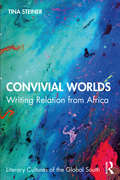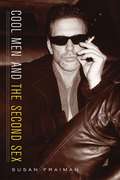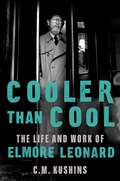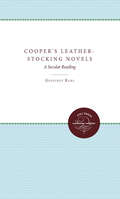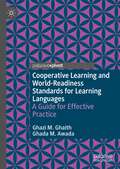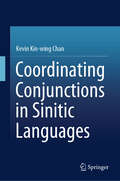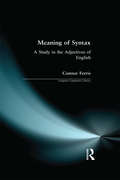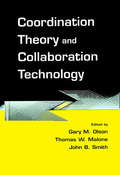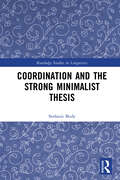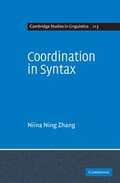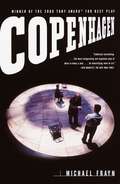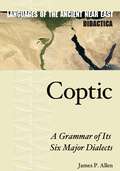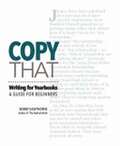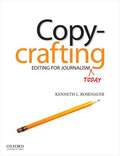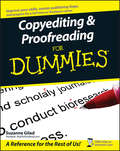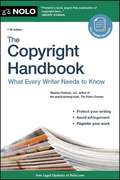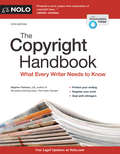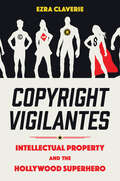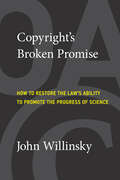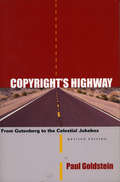- Table View
- List View
Convivial Worlds: Writing Relation from Africa (Literary Cultures of the Global South)
by Tina SteinerThis book discovers everyday forms of conviviality in fiction and life writing from Eastern and Southern Africa. It focuses on ordinary moments of recognition, of hospitality, of humour and kindness in everyday life to illuminate the significance of repertoires of repair in a world broken by relations of power. Through close readings of specific capacities of living with difference, the book excavates ideas of world-making, personhood and the possibilities of alternative social imaginaries from African perspectives. It highlights evanescent and more durable attempts at building solidarity across local and translocal settings by focussing on modes of address that invite reciprocity in contexts of injustice, which include Apartheid, colonialism, racism, patriarchy and xenophobia. Putting current research on conviviality in conversation with the literary texts, the book demonstrates how conviviality emerges as an enabling ethical practice, as critique and survival strategy and as embodied lived experience. The volume will be of great interest to scholars and researchers of Literary and Cultural Studies, especially Postcolonial Literature, African Studies and Indian Ocean Studies.
Cool Characters: Irony and American Fiction
by Lee KonstantinouLee Konstantinou examines irony in American literary and political life, showing how it migrated from the countercultural margins of the 1950s to the 1980s mainstream. Along the way, irony was absorbed into postmodern theory and ultimately become a target of recent writers who have moved beyond its limitations with a practice of "postirony."
Cool Men and the Second Sex
by Susan FraimanFraiman assesses the work of various contemporary male figures--"bad boy" innovative filmmakers Quentin Tarantino, Brian De Palma, and Spike Lee and such "celebrity" professors as Edward Said, Andrew Ross, Henry Louis Gates Jr., and Lee Edelman--all of them on the left. She argues that despite their hipness--or because of it--these men consistently relegate women to the margins and feel free to ignore the insights of feminist scholars. Fraiman discusses movies like Pulp Fiction and Do the Right Thing, as well as other popular forms from pornography to rap music.
Cool Men and the Second Sex (Gender and Culture Series)
by Susan FraimanAcademic superstars Andrew Ross, Edward Said, and Henry Louis Gates Jr. Bad boy filmmakers Quentin Tarantino, Spike Lee, and Brian de Palma. What do these influential contemporary figures have in common? In Cool Men and the Second Sex, Susan Fraiman identifies them all with "cool masculinity" and boldly unpacks the gender politics of their work. According to Fraiman, "cool men" rebel against a mainstream defined as maternal. Bad boys resist the authority of women and banish mothers to the realm of the uncool. As a result, despite their hipness—or because of it—these men too often feel free to ignore the insights of feminist thinkers. Through subtle close readings, Fraiman shows that even Gates, champion of black women's writing, and even queer theorists bent on undoing gender binaries, at times end up devaluing women in favor of men and masculinity.A wide-ranging and fair-minded analysis, Cool Men acknowledges the invaluable contributions of its subjects while also deciphering the gender codes and baring the contradictions implicit in their work. Affirming the legacy of second-wave feminist scholars and drawing as well on the intersectional work of third-wavers, Cool Men helps to reinvent feminist critique for the twenty-first century.
Cooler Than Cool: The Life and Work of Elmore Leonard
by C. M. KushinsDrawing on unprecedented archival and family access, Cooler Than Cool: The Life of Elmore Leonard, is the first comprehensive biography of the master American crime writer, author of witty, gritty bestsellers like Get Shorty and Raylan.Over the course of his sixty-year career, Elmore Leonard, “the Dickens of Detroit,” published forty-five novels that have had enduring appeal to readers around the world. Revered by Martin Amis, Margaret Atwood, Raymond Carver, and Stephen King, his books were innovative in their blending of a Hemingway-inspired noirish minimalism and a masterful use of realistic dialogue over exposition—a direct evolution spurred by his years as a screenwriter.Leonard’s fiction contained many layers, and at the heart of his work were progressive themes, stemming from his years as a student of the Jesuit religious order, his personal beliefs in social justice, and his successful battle over alcoholism. He drew inspiration from greats like Raymond Chandler and Dashiell Hammett, but the true motivation and brilliance behind his crime writing was the ongoing class struggle to achieve the American Dream—often seen through the eyes of law enforcement officers and the criminals they vowed to apprehend.C. M. Kushins tells Leonard’s full life story against recurring themes and evolving storytelling methods of his work, drawing on interviews with primary sources ranging from Leonard’s family and friends to those who acted in, produced, and directed his work onscreen. He also includes never-before-published excerpts from Leonard’s unfinished final novel and planned memoir. Definitive and revealing, Cooler Than Cool shows Leonard emerging as one of the last writers of the “pulp fiction” era of midcentury America, to ultimately become one of the most successful storytellers of the twentieth century, whose influence continues to have far-reaching effects on both contemporary crime fiction and American filmmaking.
Cooper's Leather-Stocking Novels: A Secular Reading
by Geoffrey RansJames Fenimore Cooper's Leather-Stocking tales, published between 1823 and 1841, are generally regarded as America's first major works of fiction. Here, Geoffrey Rans provides not simply a new reading of the five novels that comprise the series but also a new way of reading them.Rans analyzes each of the five novels (The Pioneers, The Last of the Mohicans, The Prairie, The Pathfinder, and The Deerslayer) in the order in which they were originally composed, an achronological sequence in terms of the stories they tell. As events in early written novels interact with those in later ones, the reader is compelled to construct political meanings different from Cooper's ideological preferences. This approach effectively precludes reading these works as Natty Bumppo's life story, or as an aspect of Cooper's. Rans presents the series as a text that faithfully reproduces the conflicts Cooper faced, both at the time when he wrote the novels and in the history that the novels contemplate.Cooper emerges as a composer of richly problematical texts for which no aesthetic resolution is possible and in which every idealization, political or poetic, is relentlessly subjected to the gaze of historical reality. The tension between potential and practice, which is apparent in the final two volumes of the tales, is present, Rans contends, from the inception of the series. Because the problems of racism and greed that Cooper addresses remained as unresolved for us as for him, Rans concludes that this reading of the Leather-Stocking tales reinforces both Cooper's central canonical position and his value as an articulator of political conflict.Originally published in 1991.A UNC Press Enduring Edition -- UNC Press Enduring Editions use the latest in digital technology to make available again books from our distinguished backlist that were previously out of print. These editions are published unaltered from the original, and are presented in affordable paperback formats, bringing readers both historical and cultural value.
Cooperative Learning and World-Readiness Standards for Learning Languages: A Guide for Effective Practice
by Ghazi M. Ghaith Ghada M. AwadaThis book provides curriculum planners, materials developers, and language educators with curricular perspectives and classroom activities in order to address the needs of learners of English as a global lingua franca in an increasingly globalized and interdependent world. The authors argue that language educators would benefit from synthesizing and using research and evidence-based cooperative learning methods and structures to address the current world-readiness standards for learning languages in the five domains of Communication, Cultures, Connections, Comparisons, and Communities. The book outlines the main cooperative learning principles of heterogenous grouping, positive interdependence, individual accountability, social/collaborative skills, and group processing, then demonstrates their relevance to language teaching and learning. This book will be of interest to students in pre-service teacher education programmes as well as in-service practitioners, teacher trainers and educational administrators.
Coordinating Conjunctions in Sinitic Languages
by Kevin Kin-wing ChanThe book is a comprehensive typological study of coordinating conjunctions in Sinitic languages and other languages worldwide, focusing on the grammaticalization pathways through which conjunctions emerge. Utilizing an extensive database of coordinating conjunctions, including first-hand data from 234 Chinese dialects and 45 non-Sinitic languages, as well as 830 sets of second-hand data, this research aims to reconstruct the primary grammaticalization paths of coordinating conjunctions in Sinitic languages while making typological generalizations and classifications. The study contributes to the understanding of how coordinating conjunctions develop in various languages and sheds light on the typological patterns that emerge across languages.
Coordinating Information and Communications Technology Across the Primary School: A Study in the Adjectives of English (Longman Linguistics Library)
by Connor FerrisThis book adopts a new approach to a major area of syntax - the way in which adjectives are bound together with other words in phrases or sentences.
Coordination Theory and Collaboration Technology (Computers, Cognition, And Work Ser.)
by Thomas W. Malone Gary M. Olson John B. SmithThe National Science Foundation funded the first Coordination Theory and Collaboration Technology initiative to look at systems that support collaborations in business and elsewhere. This book explores the global revolution in human interconnectedness. It will discuss the various collaborative workgroups and their use in technology. The initiative focuses on processes of coordination and cooperation among autonomous units in human systems, in computer and communication systems, and in hybrid organizations of both systems. This initiative is motivated by three scientific issues which have been the focus of separate research efforts, but which may benefit from collaborative research. The first is the effort to discover the principles underlying how people collaborate and coordinate work efficiently and productively in environments characterized by a high degree of decentralized computation and decision making. The second is to gain a better fundamental understanding of the structure and outputs of organizations, industries, and markets which incorporate sophisticated, decentralized information and communications technology as an important component of their operations. The third is to understand problems of coordination in decentralized or open computer systems.
Coordination and the Strong Minimalist Thesis (Routledge Studies in Linguistics)
by Stefanie BodeThis book unpacks coordination in the context of the Strong Minimalist Thesis (SMT), offering a new proposal for addressing this longstanding puzzle within research on Generative Grammar.The volume’s foundations are rooted in the SMT, which builds on the idea that laws of nature, such as simplicity, symmetry, and computational efficiency, shape the laws of language to their simplest form, as units of computation combined with a recursive structure-building device. The book explores the two main ways in which Generative Grammar research has been undertaken to deal with the issue of coordination within SMT as examined in such linguistic expressions as conjuncts, which combine in an unstructured way, but which run counter to a strictly minimalist approach. Bode proposes an alternative account of coordination based on simplest set-formation without resorting to additional mechanisms, rooting it more squarely within SMT theory and encouraging further discussion on new directions for SMT-related research.This volume will be of interest to scholars in syntax and linguistic theory, particularly those interested in minimalist theory.
Coordination in Syntax
by Niina Ning ZhangCoordination in syntax is an important part of the analysis of sentence structure. Niina Ning Zhang addresses the issues raised by coordinate pairings and the implications of these structures, looking in particular at examples within English and Chinese. The volume covers the major questions regarding coordinates in syntax, providing a fresh perspective to arguments raised within previous literature. She explains how such coordinate complexes are structured, how some coordinators can be combined in parts of speech, the fixed nature of some of these pairings and what changes exist between the coordinate and non-coordinate constructions. The theories raised are backed up by a rich variety of examples as well as providing a cross-linguistic perspective, contextualising these ideas within current syntactic research.
Cop Cat
by Barbara W. MakarA systematic, phonics-based early reading program that includes: the most practice for every skill, decodable readers for every skill, and reinforcement materials--help struggling students succeed in the regular classroom
Cop Cat and the Mule
by Barbara W. Makar"Decodable Storybooks 2A accompany More Workbook 2 and provide additional opportunity to apply the phonetic concepts introduced in Workbook 2 to connected text. The storybooks use the same vocabulary as Workbook 2 and Storybooks 2 with the addition of one sight word was. Storybooks 2A are an excellent tool to reinforce the skills from Workbook 2 and can be used with either Workbook 2 or More Workbook 2"--Epsbooks.com.
Copenhagen (Student Editions Ser.)
by Michael FraynTONY AWARD WINNER • An explosive re-imagining of the mysterious wartime meeting between two Nobel laureates to discuss the atomic bomb.&“Endlessly fascinating…. The most invigorating and ingenious play of ideas in many a year…. An electrifying work of art.&” —Ben Brantley, The New York Times In 1941 the German physicist Werner Heisenberg made a clandestine trip to Copenhagen to see his Danish counterpart and friend Niels Bohr. Their work together on quantum mechanics and the uncertainty principle had revolutionized atomic physics. But now the world had changed and the two men were on opposite sides in a world war. Why Heisenberg went to Copenhagen and what he wanted to say to Bohr are questions that have vexed historians ever since. In Michael Frayn&’s ambitious, fiercely intelligent, and daring new play Heisenberg and Bohr meet once again to discuss the intricacies of physics and to ponder the metaphysical—the very essence of human motivation.
Coptic: A Grammar of Its Six Major Dialects (Languages of the Ancient Near East Didactica #1)
by James P. AllenCoptic is the final stage of the ancient Egyptian language, written in an alphabet derived primarily from Greek instead of hieroglyphs. It borrows some vocabulary from ancient Greek, and it was used primarily for writing Christian scriptures and treatises. There is no uniform Coptic language, but rather six major dialects.Unlike previous grammars that focus on just two of the Coptic dialects, this volume, written by senior Egyptologist James P. Allen, describes the grammar of the language in each of the six major dialects. It also includes exercises with an answer key, a chrestomathy, and an accompanying dictionary, making it suitable for teaching or self-guided learning as well as general reference.
Coptic: A Grammar of Its Six Major Dialects (Languages of the Ancient Near East Didactica)
by James P. AllenCoptic is the final stage of the ancient Egyptian language, written in an alphabet derived primarily from Greek instead of hieroglyphs. It borrows some vocabulary from ancient Greek, and it was used primarily for writing Christian scriptures and treatises. There is no uniform Coptic language, but rather six major dialects.Unlike previous grammars that focus on just two of the Coptic dialects, this volume, written by senior Egyptologist James P. Allen, describes the grammar of the language in each of the six major dialects. It also includes exercises with an answer key, a chrestomathy, and an accompanying dictionary, making it suitable for teaching or self-guided learning as well as general reference.
Copy That: Writing for Yearbooks
by Bobby Hawthorne Lori OglesbeeCOPY THAT: WRITING FOR YEARBOOKS: A BEGINNER'S HANDBOOK
Copycrafting: Editing for Journalism Today
by Kenneth L. RosenauerFrom newspapers to Twitter®, the media's ability to deliver news and interact with audiences is constantly changing. In Copycrafting, author Kenneth Rosenauer provides aspiring journalists and copyeditors with the essential tools for delivering content effectively and correctly, regardless of the media platform. More than just the basics of copyediting and AP style, this complete package provides a wealth of examples and exercises for practice. This allows students to actively learn the editing skills that they will need to flourish in the constantly evolving media landscape.
Copyediting and Proofreading For Dummies
by Suzanne GiladTurn your knack for language into a lucrative careerMust-know techniques and resources for maximizing your accuracy and speedInterested in becoming a copyeditor or proofreader? Want to know more about what each job entails? This friendly guide helps you position yourself for success. Polish your skills, build a winning résumé and land the job you've always wanted. Books, magazines, Web sites, corporate documents - find out how to improve any type of publication and make yourself indispensable to writers, editors, and your boss.Balance between style and rulesMaster the art of the queryUse proofreader symbolsEdit and proof electronic documentsBuild a solid freelancing career
Copyright Handbook, The
by Stephen Fishman J.DProtect your written works with copyright, easily and legally! In the Information Age, writers need to take steps to protect their hard work. Fortunately, The Copyright Handbook provides everything you need to get the job done. Inside, you'll find the essential information and forms you need to protect all types of written expression under copyright law. Let The Copyright Handbook show you how to: register your work maximize copyright protection use a copyright notice transfer ownership of copyright avoid infringement deal with infringers understand the "fair use" rule get permission to use copyrighted work, and profit from your copyright. This edition has been completely updated to provide the latest case law and copyright regulations, and includes new information about electronically filing for copyright and expanded coverage of Internet works, such as blogs. Provides over 30 up-to-date legal and copyright forms.
Copyright Handbook, The: What Every Writer Needs to Know
by Stephen FishmanWhat copyright law protects....and doesn't No writers like to see their hard work or creativity copied by others - or to be accused of copying. Fortunately, The Copyright Handbook provides everything you need to protect yourself! Find information and forms to help you: register your work maximize copyright protection transfer ownership of copyright avoid infringement deal with infringers understand the "fair use" rule get permission to use copyrighted work profit from your copyright This edition is updated to provide the latest copyright regulations, forms and rules for filing a copyright application.
Copyright Vigilantes: Intellectual Property and the Hollywood Superhero
by Ezra ClaverieCopyright Vigilantes: Intellectual Property and the Hollywood Superhero explains superhero blockbusters as allegories of intellectual property relations. In movies based on characters owned by the comics duopoly of DC and Marvel, no narrative recurs more often than a villain’s attempt to copy the superhero's unique powers. In this volume, author Ezra Claverie explains this fixation as a symptom of the films’ mode of production. Since the 1930s, the dominant American comics publishers have treated the creations of artists and writers as work for hire, such that stories and characters become company property. Thus, publishers avoided sharing the profits both from magazine sales and from licensing characters into other media. For decades, creators have challenged this regime, demanding either shares of profits or outright ownership of their creations. Now that the duopoly rents, licenses, and adapts superheroes for increasingly expensive franchises, and for growing international audiences, any challenge to intellectual property relations threatens a production regime worth billions of dollars. Duopoly movies, therefore, present any attempt to break the superhero’s monopoly on their powers as the scheme of terrorists, mad scientists, or space Nazis—assuaging studio anxieties and revealing the fears of those who benefit most from the real-world ownership of superheroes. Weaving together legal analysis, Marxist political economy, and close readings of movies, Copyright Vigilantes explains the preoccupations of Hollywood’s leading genre.
Copyright's Broken Promise: How to Restore the Law's Ability to Promote the Progress of Science
by John WillinskyA comprehensive proposal for reforming copyright law to ensure sustainable public access to research and scholarship.Open access is widely supported by researchers, librarians, scholarly societies, and research funders, as well as large and small publishers. Yet despite this support—and the pandemic&’s demonstration of the importance of open access for scientific progress—the scholarly publishing market is failing to deliver open access quickly enough. In Copyright&’s Broken Promise, John Willinsky presents the case for reforming copyright law so that it supports, rather than impedes, public access to research and scholarship. He draws on the legal strategy of statutory licensing to set out the terms and structures by which the Copyright Act could ensure that publishers are fairly compensated for providing immediate open access. What sets Willinsky&’s analysis apart is its focus on the current state of scholarly publishing. Because copyright offers so little legal support for moving publishing to open access, though it is best for science, he says it is time to stop regarding the Copyright Act as a law of nature that can only be circumvented, contravened, or temporarily set aside. Specifically, he proposes that the Copyright Act add a new category of work, called &“research publications,&” which would be subject to statutory licensing. This would allow publishers to receive royalty payments from the principal institutional users (universities, industry R&D, research institutes, and so on) and sponsors of the work (foundations and government agencies), while providing immediate open access.
Copyright's Highway
by Paul GoldsteinFrom eighteenth-century copyright law, to current-day copyright issues on the internet, to tomorrow's "celestial jukebox”-a digital repository of books, movies, and music available on demand-Paul Goldstein presents a thorough examination of the challenges facing copyright owners and users. One of the nation's leading authorities on intellectual property law, Goldstein offers an engaging, readable, and intelligent analysis of the effect of copyright on American politics, economy, and culture. Goldstein presents and analyzes key legal battles, including Supreme Court decisions on home taping and 2 Live Crew's contested sampling of Roy Orbison's "Pretty Woman. ” In this revised edition, the author expands the discussion to cover electronic media, including an examination of recent Napster litigation, the Digital Millennium Copyright Act, and the vexed Secure Digital Music Initiative, under which record companies attempted to develop effective encryption standards for their products. Praise for the first edition: "A clever and vibrant book that traces copyright history from the invention of the printing press through current challenges to copyright from new technologies . . . . Most compelling [on] multimedia technologies. ” -Sabra Chartrand,The New York Times "This eminent authority writes with clarity, lucidity and a wry sense of humor about a subject whose complexities can be daunting. " -Jonathan Kirsch,Los Angeles Times "A wonderfully American tale of how law, literature, politics and megabucks intersect. " -William Petrocelli,San Francisco Chronicle
